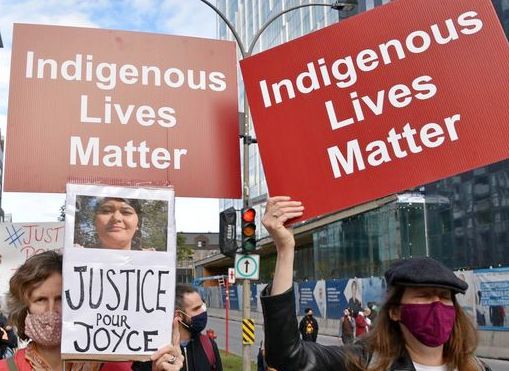Quebec Coroner’s Report on Death of Joyce Echaquan
Need to Settle Scores with Racist Concepts Underlying Today’s Political Institutions
– Pierre Soublière –
On October 1, the Quebec Coroner’s Office issued a communiqué on the death of Joyce Echaquan in September 2020, entitled “Coroner Jéhane Kamel tables her Investigation report.” It confirms that Joyce had been ostracized during her final stay in hospital and that her death was avoidable.
 The coroner points out that when she entered the Centre hospitalier De Lanaudière on the evening of September 26 of last year for her ailments, Joyce was labelled as a patient in withdrawal, which led to her calls for help not being taken seriously.
The coroner points out that when she entered the Centre hospitalier De Lanaudière on the evening of September 26 of last year for her ailments, Joyce was labelled as a patient in withdrawal, which led to her calls for help not being taken seriously.
There was no actual indication of her being in withdrawal and in later hearings it was proven beyond a doubt that Joyce was using strictly prescribed medication for her health problems. Moreover, when she became agitated, she was physically restrained. It is stated that Joyce’s death was due to pulmonary edema and that other relevant factors contributing to her death could be “hypotension due to an administered injection of Haldol as well as to the restraints which held Mrs. Echaquan nailed to her stretcher without the possibility of sitting up, which is a natural thing to do when there is an accumulation of water on the lungs.”
A lack of proper supervision was raised as another contributing factor. The communiqué also points out that the Viens Commission which, one year before Joyce’s death, inquired into “the relations between Indigenous communities and certain public services,” had been alerted as to concerns the Atikamekw community of Manawan had regarding the services provided to them at the Centre hospitalier De Lanaudière.
In the recommendations, it is stated that the Quebec government must “acknowledge the existence of systemic racism within our institutions and commit to working towards its elimination.” At her press conference on October 5, the coroner pointed out that though the National Assembly and the media had made quite an issue surrounding this statement about systemic racism, it was important to consider other extremely relevant recommendations such as working closely with the Atikamekw community and addressing hospital staffing shortages.

One of the 94 calls to action of the Truth and Reconciliation Commission is that “all governments repudiate concepts used to justify European sovereignty over Indigenous peoples and lands, such as Doctrine of Discovery and terra nullius.” This is getting to the heart of the matter, as it touches upon the very foundations on which the Canadian constitution and today’s political institutions are based. In our struggles for the rights of all, it is becoming inevitable to discuss the changes that need to be made to these constitutional and institutional foundations.


